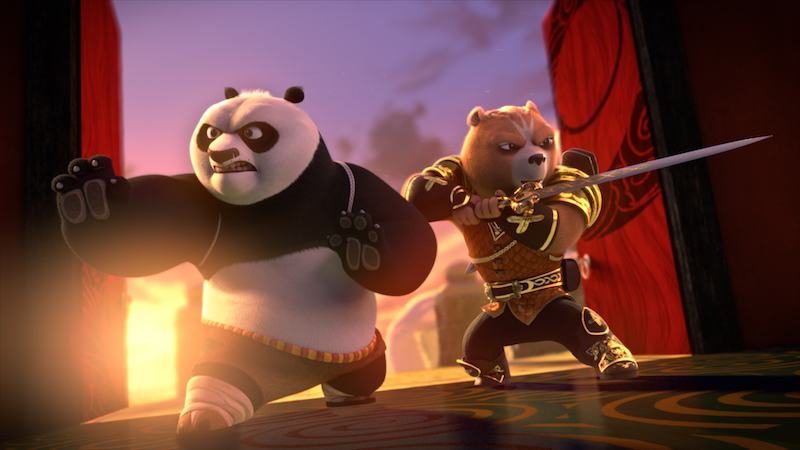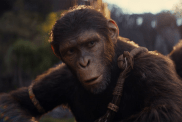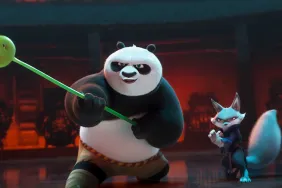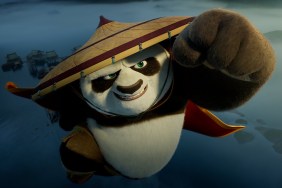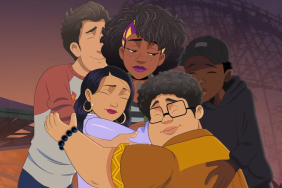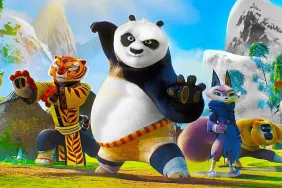ComingSoon spoke to executive producers Peter Hastings and Shaunt Nigoghossian about the latest Dreamworks animated series, Kung Fu Panda: The Dragon Knight. It is now streaming on Netflix.
Tyler Treese: Peter, you also developed the previous Kung Fu Panda series, Legends of Awesomeness. This time, you got Jack Black back as Po. How exciting was it to get him involved? He just brings such an energy to the performance, and that’s such a big name to be attached.
Peter Hastings: Well, it’s just like what you said, it’s just super exciting to get him. We’d already started, and it was right at the beginning of the pandemic. We all went home, and it was like, “I wonder if Jack is also sitting at home?” And so he was available and wanted to do the series. So we had a meeting, it just kind of clicked. He’s read the scripts, he’s really enjoyed it. And then he comes in. Mick Wingert, who did a couple of the other series, does a fantastic job, but Jack is Jack. He’s got this secret sauce … he just is that guy, you know? Po is Jack Black. And so he comes in with enthusiasm and he comes in enjoying it. We get to play while we’re doing the voice and it really just elevates the whole thing. And then of course it also deliciously makes our show a little more high profile that Jack is in it, because that would definitely attract me, hearing that. So he’s just a bonus all the way around.
Shaunt, talk to me about the storyline structure you went with here for the show. It has that big two-part finale and it’s quite the journey. It’s not as much a week-to-week thing, it’s almost like one big film.
Shaunt Nigoghossian: It is. That’s exactly what it is. That’s, exactly what Peter pitched. In the beginning, this was the idea here from Dreamworks was we want to make, basically, one long movie. We want to make it extremely cinematic. We want to follow characters. We want to dive into Po in a way that we don’t have enough time to in the movies because we have to get to the plot and get to this and get to that. So this is really the first opportunity we’ve had where the technology’s good enough to make something look around feature level on TV budget, but also to be able to expand on a story and expand the characters in this way. So we’ve taken that cinematic approach with the visuals, [and] even with the dialogue. We allow time and space, we just allow people to not talk and just feel, which, usually in TV, you’ve got to keep it moving because there’s so much to do. But this form really gives us an opportunity to just do things we haven’t done before. It’s very exciting.
Peter this is another chance to come back to this series. So what were the biggest lessons that you learned from Legends of Awesomeness that you were able to apply here?
I think it’s the understanding of the character of Po and that he is the engine that drives it. Sometimes you have a series with a strong character like we do on this one, and they inform everything. They inform the pacing, they inform the design, they inform the style of humor, the emotional stuff, the fighting kind of thing. And I think on that show, [it was] really learning that Po is this kind of character: He’s a lovable loser who can kick butt. And it’s such a great combination because the comedy is in there, the emotion is there, and the action is also in there. This show, design-wise and the final picture is such a step up. I’m just constantly amazed. I see a lot of rudimentary animation, and then when we finish doing the lighting and the effects and all that kind of stuff, I’m just like, “oh my gosh, this looks so good.” It’s surprising and super fun to watch. But I think mainly just knowing Po’s psyche so well was really the benefit of the first series.
Shaunt, we get introduced to Wandering Blade in this series, he’s voiced by Rita Ora. What did you enjoy most about exploring that dynamic that she has with Po and getting to really introduce her to this audience?
Nigoghossian: One thing I’ll say is that when we first were listening to all the dialogue from all the different actors, Rita really stood out. We did a casting call, and so we had a bunch of different voices, and Rita’s voice is so unique and individual that we all were just like, “no, no, that’s the one!” And we weren’t sure how she was going to do, because she hasn’t done this type of project before. She’s done very many other things. But she came in and she just like knocked it out of the park. She’s as good a voice actor as anybody who’s a voice actor. And so it’s kind of fun to work with her because even in the physicality, her character is very stern and very hardened, and she’s got a mission and she doesn’t move a lot.
She doesn’t smile. Her head doesn’t move that much. Her body doesn’t move. So anytime someone has her doing something like this [turns head], I’m like, “nope, pull it back.” And when she fights, she’s rigid — that’s kind of her thing. But Po, when he walks, he bounces and he’s like, “come on Blade! Let’s do this or whatever!” His fighting style is Kung Fu, so you can see both in the physicality, in their actual design, and their color and everything, they are opposites to each other. When he walks, he walks like this, and she walks like this. That’s the fun part, is that in our series, she has to learn to be like this and he has to learn to be like this. They have to learn from each other. That’s the magic.
Peter, Netflix and streaming has really changed how people watch shows, and so many people binge shows now. Are there any considerations towards that when you’re making a show now?
Hastings: Oh yeah, absolutely. Our first season is 11 episodes, and it’s basically four hours. So it’s kind of like a four-hour movie. I actually heard a funny joke that someone said: “do you want to watch a 10-hour movie?” “No.” “Do you want to watch 10 separate hour-long episodes back to back?” “Okay.”
We’re all so used to that now — diving in and watching the next show. So there are certain things that definitely … some mechanical things. Very often on streaming shows, there’s definitely a hook at the end of an episode that almost forces you out of curiosity to keep watching. And the other thing is that you know you can lay things in that aren’t necessarily going to pay off until a couple [of] episodes later.
But the thing is, a lot of the audience really watches it like a movie. It’s like we have this first season coming out on July 14th, and I know a lot of people will watch the whole thing that weekend, almost like a movie. So I think what it does is [it] gives us freedom. We don’t have to wrap everything up inside every episode, and it just kind of flows. I encourage people to watch it straight through or watch several episodes at once. It’s a little more fun.
Nigoghossian: There’ve also been a couple of times when we’ll be like “oh man, this episode’s long. We have to cut something.” And we start another episode where we replay the beginning of the last episode, and Peter’s like, “ah, they’re going to watch it one right after the other. Let’s just get rid of it!”
Shaunt, I was really glad to see the legendary James Hong return, and it’s wild seeing him be this active still at 93. How great was it to involve the character in Mr. Ping here?
Nigoghossian: He’s the best, hands down. He is the best. He is the most fun, amazing guy to work with. So Peter does the recording and Peter probably has a bunch of stories, but I can tell you from the art side, the crew just cracks up listening to his dialogue because he does things that no one else does. We have a scene where he is break-dancing, Mr. Ping. And just the sounds he makes for break dancing are like, “what?! , where does he come up with this?” So yeah, he’s fun. And most of the lines that he says … I don’t know if it’s just sort of where he is from or his acting chops or what, but he says lines in the weirdest ways that no one else could ever do it his way. And it’s just so much fun to work with it. It makes you twist Mr. Ping’s neck sometimes because it’s like, I don’t know what acting to do with that, but it’s cool.
Hastings: Yeah, he’ll read a line, and I might explain the context of the line to him, but then he’ll read it like six times every time, all completely different, and they all work. So it’s always a challenge to find the perfect one. And he’s so great. He’s also the only person who’s been in every single Kung Fu Panda iteration.
Peter, you’ve had such a great career of work. With Pinky and the Brain and Kung Fu Panda and a lot of Dreamworks’ catalog, it’s able to be fun for the whole family. It’s not just targeting kids. It’s not pandering towards adults. You’re able to find this great middle ground. So what’s the key to that balance.
Hastings: I think there’s a few things, and I kind of always been that since I started with, Animaniacs and Pinky and the Brain and those shows. One of the things was [that] we wanted to make ourselves laugh. That’s really what happened a lot on those shows. Then it’s about not being inappropriate, but I think that … here’s the really central thing. I think of it not as for kids, not as for adults, but for people. What works for people? And then basically, there are simple emotional cores to things that you feel if you’re five years old or if you’re 50 years old. So there’s that, and I just always want to make shows that I would be willing to watch and want to watch. That’s pretty simple. So I’m not making it kind of for other people, I’m making it for people, including myself.
Shaunt, you did such great work on Blood of Zeus. Are you involved on season two of that?
Nigoghossian: Unfortunately I was on this show while I was finishing up season one of Blood of Zeus. So when Blood of Zeus Season 2 started, I was still here. I couldn’t jump over to that. But there is a great director working on that who’s going to take the reins. I’ve worked with him before and he’s going to do an awesome job. The scripts are amazing on Blood of Zeus season two, I can tell you that. They take it up a notch from season one. People are going to be very happy,
Hastings: As a testament to our show, Shaunt had just come off Blood of Zeus. It was his big hit, and they were like, “come back, come back, come back.” And he’s like, “I think I’m going to stay on this one. I’m going to stay on Kung Fu Panda.” And he has done such an awesome job with the team.
It really speaks to your versatility, going from something more adult-animated to the classic Dreamworks fun for the whole family vibe.
It’s interesting, because when you work on something adult, you’re dealing with a lot of really cool themes and everything. With Blood of Zeus, it was really fun to work on that. In my career, I’ve also worked in prime time and I’ve also worked in comedy. And I worked for young kids and I’ve done a lot of things. And Kung Fu Panda is the show where I actually get to put all of the skills together. I’m not limiting, “oh, I can’t do comedy on this show. I can’t do this.” So it’s almost harder to do Kung Fu Panda because you have so many things to balance, but it’s also the greatest challenge. And there’s a point in your career where you’re just like, “I just need something harder. I just need something different. I just need something that’s challenging all of me.” That’s what the show has been but in a fun way.
Peter, you’ve done so much great work with this franchise. Are you still interested in doing more adventures in the Kung Fu Panda world? Because I think as we see here it’s been established that it can go in so many interesting directions even like with or without Po.
Hastings: To me, Po is really the engine on this thing, and he’s such a great character. It’s just one of those characters that gets so well developed and the people become so familiar with, that you can say, “What if Po opens a Kung Fu studio? What if Po buys a cruise ship? What if Po [does this]?” and it’s like, if you’re familiar with a fun character, you go like “that could work. There could be something there. That could do that.” And that’s why the whole franchise has succeeded through the movies and the TV shows. It’s just because it’s not about “how are we going to come up with another story?” It’s like, “how are we going to have more fun with this character? “You know? So I think it keeps going.
